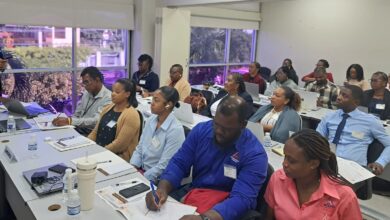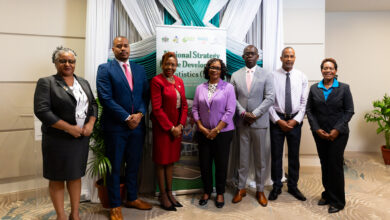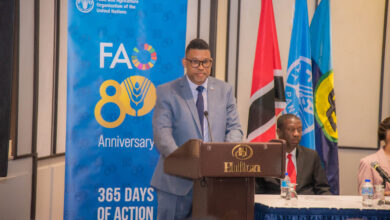Regional statisticians and stakeholders in the sector are meeting in Bridgetown, Barbados, this week on the heels of the observances earlier this month of Caribbean Statistics Day and World Statistics Day, both celebrated under the theme ‘Better Data, Better Lives’.
The Barbados meetings are the 40th Meeting of the Standing Committee of Caribbean Statisticians (SCCS); the 25th Meeting of the Regional Census Coordinating Committee (RCCC); and the 8th Regional Statistical Research Seminar.
Delivering remarks at the general opening ceremony of the meetings, Dr. Philomen Harrison, Project Direction, Regional Statistics at the CARICOM Secretariat said that the SCCS and the RCCC should provide opportunities for reflection on the theme of Better Data for Better Lives. Such reflection, she said, would ensure that efforts were made to improve the range, quality, relevance and timeliness of the data produced and disseminated, to ensure internal harmonisation within country, as well as conformity to Regional and international standards.
She pointed out that the use of data by policy-makers, researchers, students and others had to be pursued if there was to be impact on the lives of the people of the Community.
She underscored the need for governments to invest more in statistics on a sustained basis. Given the scarcity of resources, Dr. Harrison suggested that a much more vibrant Regional agenda should be pursued with the International Development Partners (IDPs) being encouraged to pursue this course.
“Fundamentally, strategic approaches at the national and Regional levels, that would enable us to determine what is feasible among all the policy areas and frameworks and what statistics are required to be produced as priority to address the expectations of the users for statistics, are required at this time,” she told the opening ceremony.
She pointed out that the statistical community worldwide was faced with the task of producing the indicators for the 2030 Agenda for Sustainable Development which would impact the work of the National Statistics Offices and Systems for the next 15 years. Additionally, she said, as CARICOM Small Island Developing States (SIDS), the Region also had on its Agenda the monitoring of the SAMOA Pathway.
The Community Strategic Plan 2015-2019 will also place demands for statistics on our somewhat weak statistical infrastructure.
I take this opportunity to urge Governments of the Region to invest in Statistics on a sustained basis so that the National Statistical Offices and Systems in general can drive the implementation of these frameworks,” Dr. Harrison told stakeholders.
See full remards below:
We commiserate with the Member State of Barbados with respect to the traffic accident that occurred yesterday (Sunday) morning and which claimed the loss of lives.

Project Director, Regional Statistics
I would like to thank the Representative of the UN Women Multi-country Office in the Caribbean Ms Christine Arab who volunteered to financially support this meeting through providing us with the meeting venue, the chairs and tables and other equipment, the catering costs and organisational, communication and other logistical support at a time when we (the SCCS and Member States) needed this the most. Fundamentally, she provided a group of very efficient staff.
Therefore, I would like to thank her and her staff most sincerely for going beyond the call in making this series of meeting possible.
For both the BSS and UN Women, we can say, “…out of little cometh much…”
The theme for this series of meetings is in-keeping with the theme for the Second World Statistics Day and the Seventh Celebration of Caribbean Statistics Day which is:
“Better Data- Better Lives”
Evidently both the SCCS with its 40th meeting and the RCCC with its 25th Meeting have reached important milestones reflecting the resilience of these committees. While the SCCS has some noble objectives we can reflect in concrete terms on the real contributions of this committee in enabling better statistics in the Community.
Some of these contributions are:
The SCCS provides an opportunity to review the work put in place in countries across the region in key areas of statistics- Economic, Social/Gender, Environment and Information Communication Technology;
Lessons learnt and solutions to challenges faced based on the experiences of others are acquired and put to use;
The building of synergies that can lead to South-South cooperation and the exchange of information are achieved;
There is the engendering of competitiveness among the NSO’s that can positively improve the timeliness of results;
Adherence to International and Regional standards that can lead to more harmonised statistics is facilitated;
It is also a forum where potential support from International Development Partners can be initiated or augmented; and
A spirit of the Community and CARICOM identity is engendered exhibited in the passion, the energy and camaraderie among statisticians at all levels at the regional workshops and meetings.
The 40th SCCS and the 25th RCCC should therefore be opportunities for us to reflect on the theme of Better Data for Better Lives- to ensure that we make efforts to improve the range, quality, relevance and timeliness of the data produced and disseminated, to ensure internal harmonisation within country as well as conformity to regional and international standards
Fundamentally the promotion of the use of the data by policy-makers, researchers students etc. must be pursued if we are to impact the lives of the peoples of our Community.
The statistical community worldwide is faced with the task of producing the indicators for the 2030 Agenda for Sustainable Development which will impact the work of the NSOs/NSSs for the next 15 years. Additionally as CARICOM Small Island Developing States (SIDS) we also have on our Agenda the monitoring of the SAMOA Pathway. The Community Strategic Plan 2015-2019 will also place demands for statistics on our somewhat weak statistical infrastructure.
I take this opportunity to urge Governments of the region to invest in Statistics on a sustained basis so that the National Statistical Offices and Systems in general can drive the implementation of these frameworks.
Given the scarcity of resources perhaps a much more vibrant regional agenda should be pursued and the International Development Partners (IDPs) should be encouraged to pursue this course.
Fundamentally, strategic approaches at the national and regional levels, that would enable us to determine what is feasible among all the policy areas and frameworks and what statistics are required to be produced as priority to address the expectations of the users for statistics, are required at this time.
In this context the collaborative training workshop on National Strategies for the Development Statistics (held last week) was timely in providing the leadership of our NSOs with the knowledge and the tools to pave the way ahead given the data revolution required in CARICOM which will include the exploration of the role of Big Data in official statistics production.
There are a number of regional frameworks (such as the common Regional Statistical Work Programme, the CARICOM Model Bill and a Data Policy) that have been developed to support the production of statistics, but without the means of implementation in some cases at the national and at the regional levels.
However there are areas of statistics and countries of which we can be proud – much inroads have been made in the area of Environment Statistics and Social/Gender Statistics than what existed 15 years ago through the support of the United Nations Statistics Division, the European Union, the IDB, the World Bank, the UNFPA, DFID, the Caribbean Development Bank, the Government of Canada, PARIS21, the UN Women and many other partners.
While it is acknowledged that key data gaps remain in both areas as well as in some countries, there are countries such as Suriname, Belize, Jamaica and Dominica that have now produced 5 or more publications in Environment Statistics others such as Bermuda with three reports and a couple other countries with two reports in this area of Statistics. The Secretariat also routinely collects data on Social/Gender Statistics under a number of themes. This activity did not exist 15 years ago except for population data mainly.
I therefore urge the heads of statistical offices to continue the drive to produce better data- with the passion and energy and leadership that is so pervasive in the SCCS and in other statistical fora.
In closing I would like to draw attention to the departure of our good friend and colleague from The Bahamas Department of Statistics, Ms. Kelsie Dorsett who proceeded on pre-retirement leave recently We welcome her successor who is Ms Leona Wilson to our fold. I would also like to welcome Ms Melinda Williams the Director of Statistics, Bermuda who is attending her first meeting in this capacity as well as the Ag. Director of Statistics of Trinidad and Tobago, Mr Sean O’Brien. You will find that statisticians are not dull and the subject of statistics is fun.
Once again I warmly thank the Government and people of Barbados, the Director of Statistics and staff of the BSS and the head of UN Women and her staff for their contributions to the convening of these meeting as well as the staff of the CARICOM Secretariat for their usual support.
We have reached 40 let us make 40 more! Let us produce disseminate and promote the use of Better Data for Better Lives in CARICOM.
I thank you
Dr. Philomen Harrison
Project Director, Regional Statistics
CARICOM Secretariat






